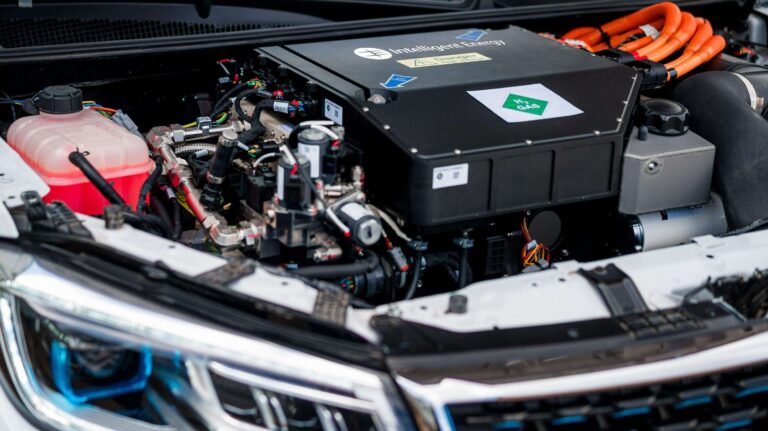Intelligent Energy (IE), a UK fuel-cell developer and manufacturer, has unveiled the first engine-shaped hydrogen fuel-cell system developed in the UK for the passenger car market.
Claimed to be smaller and more powerful than any other solution on the passenger car market, DRIVE is a single stack platform capable of 157kW gross electrical power.
The fuel-cell system has been designed in the shape of a traditional engine to meet the low bonnet requirements of passenger cars and includes the fuel-cell stack, electronic control unit, heat exchanger and balance of plant.
What’s more, patented direct water injection technology means DRIVE’s heat exchanger is up to 30% smaller at equal net power output.
The design of the direct water injection system has also reportedly enabled IE to reduce its component count and bill of materials. For example, IE’s fuel-cell doesn’t require a humidifier and related parts.
READ MORE: Carbon-negative gas set to increase green fuel production for transport by 70%
Meanwhile, a single pass heat exchanger in a test SUV, provided by Changan UK at IE’s Loughborough headquarters, measures 0.34m² but enables cruising at 130km/h in peak temperatures and a speed of 90km/h to be achieved when travelling up a long, steep hill.
According to IE, having a small heat exchanger makes vehicle packaging much easier and benefits fuel-cell vehicle design, particularly in relation to bonnet height and improved driver visibility.
David Woolhouse, Intelligent Energy’s chief executive, said: “With 25% of all passenger cars expected to have hydrogen fuel-cell powertrains, this clean technology represents the future.
READ MORE: XPO Logistics expands use of HVO fuel and electric-powered vehicles
“I’m proud that, as an independent and privately-owned company, Intelligent Energy has developed a breakthrough solution that can open up the market for passenger car manufacturers that need to package a more powerful system into their vehicles.
“DRIVE has the potential to shake up the hydrogen fuel-cell market and accelerate the transition toward zero-emission mobility.
“Fuel-cell manufacturing will be a major driver of economic growth.”
READ MORE: NatPower invests £10bn to support UK energy transition
Under full-scale, high-volume manufacturing conditions, IE said it predicts the DRIVE fuel-cell system will cost around £100 per kW by the end of the decade, making it less expensive than battery-electric vehicle solutions and comparable to internal combustion engine.
DRIVE is the result of a four-year project – named ESTHER – that commenced in November 2019 and was supported by the Advanced Propulsion Centre.
The £22m initiative involved Changan R&D Centre, Lyra Electronics and Alexander Dennis. Changan provided three SUVs to enable fuel-cell testing.
Achievements and innovations in alternative fuels will be celebrated at the third annual CiTTi Awards, which will be held on 26 November 2024 at De Vere Grand Connaught Rooms in London. Nominations are open now! Please visit www.cittiawards.co.uk to learn more about this unmissable event for the UK’s transportation sector.





